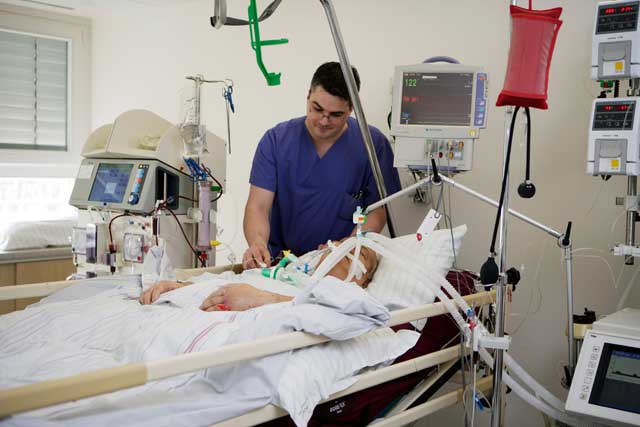Nursing: Wanted – teamwork and precision and an attention to detail

Your support helps us to tell the story
This election is still a dead heat, according to most polls. In a fight with such wafer-thin margins, we need reporters on the ground talking to the people Trump and Harris are courting. Your support allows us to keep sending journalists to the story.
The Independent is trusted by 27 million Americans from across the entire political spectrum every month. Unlike many other quality news outlets, we choose not to lock you out of our reporting and analysis with paywalls. But quality journalism must still be paid for.
Help us keep bring these critical stories to light. Your support makes all the difference.
Life and death decisions in the operating theatre are a long way from the car production line, but Spencer Hampton has found some of the same skills are important.
Working as a team and the need for precision and attention to detail are just two of the skills required in both workplaces; Hampton's experience on the assembly line floor has stood him in good stead for a new career as a theatre assistant to neurosurgeons.
Hampton was 35 when he was made redundant following the collapse of the Rover plant at Longbridge in 2005. The current economic uncertainty has brought many more career changers and mature applicants to healthcare courses.
The number of applications for nursing is booming. Figures from UCAS show they have gone up this year by nearly 74 per cent for degree courses starting in September and by 57 per cent for the nursing diploma. This is the last year some universities will be offering the diploma, which has been the most popular route into nursing. The Government has announced that from 2013 registration as a nurse will mean acquiring a degree.
To get into healthcare Hampton went back to college for a City and Guilds qualification after being encouraged by NHS recruiters at a job fair. "To start with, I just laughed. It wasn't for me," he says. "But, as they pointed out, how do you know until you try?"
Then he enrolled on a two-year diploma in Operating Department Practice at Birmingham City university, learning the skills required to help surgeons and anaesthetists in theatre. He passed with a commendation and immediately found work in the neurosurgery department of University Hospital Birmingham.
Nursing is regarded as a safe option in a time of economic uncertainty but there is another attraction – students on pre-registration courses do not pay tuition fees and qualify for a £6,000-a-year bursary if they enroll on the diploma and a means-tested bursary of up to the same amount for degree courses.
Applications for nursing courses at Birmingham City University have risen by 82 per cent this year, more than the UK average. In the recession, many have figured out it is a relatively secure career to go into, says Louise Toner, the associate dean in the faculty of health.
The number of mature applicants has outstripped those from school leavers at Edge Hill University in West Lancashire. Across the four branches of nursing – adult, children's, learning disabilities and mental health – the biggest rise has been in adult nursing followed by midwifery, which already requires a bachelor's degree.
Applicants must have five A*-C grade GCSEs including maths and English, which comes to at least 240 UCAS points says Alex Vjestica, Edge Hill's acting head of pre-registration nursing common education programmes. "We are a widening participation university and we look at alternative qualifications students might have achieved such as the BTEC national diploma or access courses," she adds.
Edge Hill also runs an intensive six-week, fast-track programme that qualifies successful students for a place on a nursing course. "We have had people in their 50s and even someone of 57 who had brought up a family and decided it was her time for a career," she says. "After qualifying at 60 she is working as a community nurse and thoroughly enjoying it."
Mature students are often the most successful and are less likely to drop out, says Graham Boswell, the programme director for postgraduate diplomas at City University London.
"Nursing is very rewarding but some of the jobs you do are not that pleasant. When I trained there were a number of 18-year-olds who liked the idea of helping people when they were ill but were horrified at being asked to provide basic care. When you have people coming into nursing who are older they have more experience and understand that the less pleasant aspects are part of the job."
With the steep increase in interest in nursing courses, how can you get a head start? Volunteering might be a way of proving you have the personal qualities, says Julie Greenwood, the managing director at Hays Healthcare, the recruitment group.
"Good nurses have a balance between theoretical understanding and people skills, developed through time spent on wards. From 2013 all nurses will have to have a degree, so factor this in if you are contemplating the profession," she says.
Areas of nursing which have a shortage of skilled nurses are accident and emergency, intensive care, neonatal, paediatric and theatre.
Join our commenting forum
Join thought-provoking conversations, follow other Independent readers and see their replies
Comments